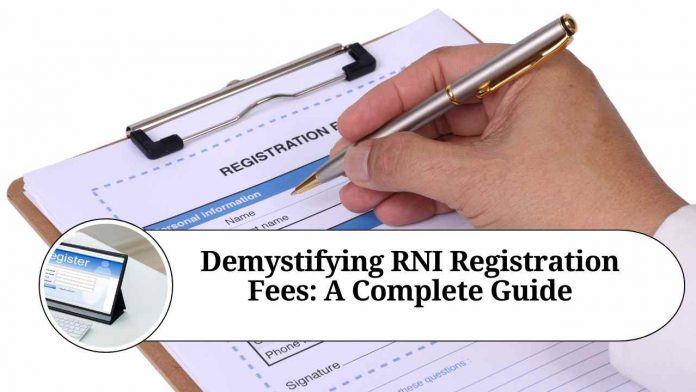Introduction:
If you’re planning to start a newspaper or periodical publication in India, one of the essential steps is to register it with the Registrar of Newspapers for India (RNI). The RNI is a statutory body established under the Press and Registration of Books Act, 1867, responsible for the regulation and maintenance of records of newspapers and publications in the country. As part of the registration process, there are certain fees associated with RNI registration. In this blog post, we will explore the various aspects of RNI registration fees to help you understand the financial implications of starting your publication.
- Application Fee:
The initial step in the RNI registration process is to submit an application. To initiate the process, you are required to pay an application fee. As of the knowledge cutoff date (September 2021), the application fee for registering a newspaper is INR 50,000, while for periodicals, it is INR 10,000. Please note that these fees are subject to change, and it’s always advisable to check the latest fee structure on the official RNI website.
- Registration Fee:
Once your application is accepted by the RNI, and all the necessary documents are in order, you will need to pay a registration fee to complete the process. The registration fee differs based on the type of publication you are registering.
a) Newspapers: For newspapers, the registration fee is calculated based on the average number of pages published per issue in the preceding 12 months. As per the current guidelines, the fee is INR 125 per page for a daily newspaper and INR 25 per page for a non-daily newspaper. However, there is a minimum fee requirement regardless of the number of pages. For daily newspapers, the minimum fee is INR 5,000, and for non-daily newspapers, it is INR 1,000.
b) Periodicals: For periodicals, the registration fee is based on the number of issues published per year. As of now, the fee is INR 1,000 per issue, subject to a minimum fee of INR 5,000.
- Additional Charges:
Apart from the application and registration fees, there might be additional charges that you need to be aware of:
a) Late Fee: If there is a delay in submitting the application or payment, the RNI may impose a late fee. The late fee amount is calculated at the rate of 2% per month, subject to a maximum of 200% of the registration fee.
b) Change of Title Fee: If you decide to change the title of your registered newspaper or periodical, you will be required to pay a fee for the change. As of now, the change of title fee is INR 500.
c) Duplicate Copy Fee: In case you lose the original certificate of registration issued by the RNI, you can obtain a duplicate copy by paying a fee. The current fee for a duplicate copy is INR 100.
Conclusion:
Registering your newspaper or periodical with the RNI is a crucial step to ensure legal compliance and credibility. While the RNI registration fees might seem significant, they are necessary to maintain the regulatory framework and support the functioning of the RNI. It is essential to stay updated with the latest fee structure by referring to the official RNI website or contacting the RNI office directly. By understanding the fees involved, you can plan your finances accordingly and embark on your publishing journey with confidence.
Read more useful content:
Frequently Asked Questions (FAQs)
Q1: What is RNI registration, and why is it necessary?
A1: RNI registration refers to the process of registering a newspaper or periodical publication with the Registrar of Newspapers for India. It is necessary to ensure legal compliance, maintain records of publications, and establish credibility in the industry.
Q2: How much is the application fee for RNI registration?
A2: As of September 2021, the application fee for registering a newspaper is INR 50,000, while for periodicals, it is INR 10,000. However, it’s advisable to check the latest fee structure on the official RNI website.
Q3: How is the registration fee calculated for newspapers?
A3: The registration fee for newspapers is based on the average number of pages published per issue in the preceding 12 months. It is INR 125 per page for daily newspapers and INR 25 per page for non-daily newspapers, with minimum fees of INR 5,000 and INR 1,000, respectively.
Q4: What is the registration fee for periodicals?
A4: The registration fee for periodicals is INR 1,000 per issue, subject to a minimum fee of INR 5,000.
Q5: Are there any additional charges associated with RNI registration?
A5: Yes, there might be additional charges. These include late fees for delayed submissions, change of title fees if you decide to change the registered title, and fees for obtaining duplicate copies of the registration certificate.
Q6: How much is the late fee for delayed submissions?
A6: The late fee is calculated at a rate of 2% per month, with a maximum cap of 200% of the registration fee.
Q7: What is the fee for changing the title of a registered publication?
A7: As of now, the fee for changing the title of a registered publication is INR 500.
Q8: How much is the fee for obtaining a duplicate copy of the registration certificate?
A8: The current fee for obtaining a duplicate copy is INR 100.
Q9: Can the RNI registration fees be paid online?
A9: Yes, the RNI accepts online payment for registration fees. The official RNI website provides details regarding the accepted modes of payment.
Q10: Is it possible to get a refund on the RNI registration fees if the application is rejected?
A10: No, the RNI registration fees are non-refundable, even if the application is rejected. It is important to ensure that all necessary requirements are met before submitting the application to avoid rejection.




















